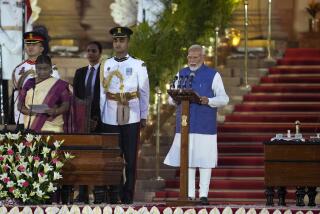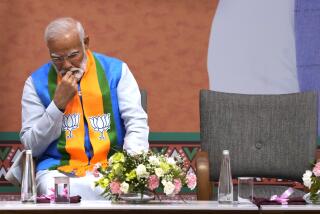Gandhi Resigns; Opposition Government Seen : India: The prime minister’s party lost its parliamentary majority in last week’s elections.
- Share via
NEW DELHI — Prime Minister Rajiv Gandhi resigned today, apparently clearing the way for an opposition government, after his ruling party suffered its second-most humiliating defeat in four decades in national elections now viewed as a watershed in Indian politics.
Gandhi’s resignation, which he personally delivered to India’s largely ceremonial President Ramaswamy Ventkataraman this morning, was seen by several analysts as a strong indication that the ruling Congress-I party had resigned itself to a new role in the opposition for only the second time in four decades.
With almost all of the results now counted in the parliamentary elections that ended Sunday, Gandhi’s party had won just 190 seats in the 543-member Parliament. However, none of the three major opposition blocs had secured a majority either.
The opposition, led by Gandhi’s defense minister, Vishwanath Pratap Singh, was to meet later today in an effort to chose a prime ministerial candidate who could lead a minority government. The new government already has been guaranteed support from the country’s extreme right- and left-wing minority parties.
The resignation of the 45-year-old prime minister had been expected for the past two days, after the election returns made it clear that Congress-I had lost its majority for only the second time since Indian independence in 1947.
President Ventkataraman asked Gandhi to stay on as a caretaker prime minister until the president selects the party that will form a new government. Gandhi accepted.
The president also accepted the resignations of Gandhi’s Cabinet ministers, who will also stay on until a new government is formed.
As Gandhi was meeting with the president, the election commission announced that Gandhi had retained his own seat in Parliament by a margin of 200,000 votes. But Gandhi’s official resignation merely capped a grim week of reckoning for the ruling party. Many analysts saw the elections as a total rejection of the family dynasty that has ruled Indian virtually without challenge for 42 years.
On Tuesday, even the family and co-conspirators in the assassination of Gandhi’s mother were swept into office.
Five years after bodyguard Beant Singh shot and killed Prime Minister Indira Gandhi, his widow, Bimal Kaur Khalsa, was declared a member of the Indian Parliament.
The assassin’s father, Sucha Singh, was also declared a winner.
In perhaps the ultimate rebuke to four decades of dynastic rule, voters in the north Indian state of Punjab also delivered equally huge parliamentary victories for the two men accused of masterminding the assassination. Both had campaigned from prison.
As the political opposition sought to form a minority government, expected to be unveiled today or Thursday, it became clear that the voters had repudiated one of the longest-serving political dynasties in the modern world.
“To borrow a phrase from the old British Empire, Prime Minister Rajiv Gandhi has just presided over the liquidation of a dynasty,” analyst Rajni Kothari said.
Rajiv Gandhi inherited the leadership of the Congress-I party from his mother, Indira, and his grandfather, Jawaharlal Nehru, the first prime minister after independence in 1947.
“As far as Mrs. Beant Singh is concerned,” Prof. Kothari said, “her victory certainly is an assertion of that anger toward the ruling family.”
There were other signs that India’s increasingly sophisticated voters finally have lost faith in the Gandhi family.
Maneka Gandhi, the 33-year-old widow of Indira Gandhi’s son Sanjay, also scored an overwhelming victory, seven years after her mother-in-law threw her out of the house and publicly declared her “Family Enemy No. 1” for challenging party policies.
Arun Nehru, a cousin of Rajiv who publicly split with the family two years ago, also won a seat in Parliament.
But as symbols go, analysts said, the victories of the relatives of Indira Gandhi’s assassins are the most dramatic.
All are members of the Sikh community, which for the past decade has been torn apart by a secessionist movement in the state of Punjab, where Sikhs predominate. And at least half of those elected to Parliament in Punjab are either members of or sympathizers with the Sikh secessionist movement. One is a terrorist who has confessed to public bombings and at least one airline hijacking.
Beant Singh and Satwant Singh (no relative), his accomplice in the killing of Indira Gandhi, were both Sikhs. One was killed by other guards just after the shooting, and the other was hanged last year.
Hindu mobs took to the streets after the assassination, and thousands of Sikhs were killed. But no one was convicted during Rajiv Gandhi’s five years in power. Several members of the Congress-I party are believed to have been involved, and at least one was defeated last week.
Many Sikhs said they were voting against the ruling party as a way of protesting.
“The vote, you see, is also an indication that the Sikhs are still in great anguish,” Prof. Kothari said. “It is an assertion against the ruling family that declares: ‘You have not yet punished the guilty. You have only hanged the assassins.’ ”
Kothari is one of many analysts who see the election of secessionists and the family and friends of assassins as something more than symbolic. They say it is a potentially positive sign for the strife-torn state of Punjab, where fighting over the secession issue has left thousands dead in recent years.
“Certainly some of the voting is a severe rebuke to the ruling family, but the fact that it took place in the parliamentary process and not in street killings is very reassuring and encouraging,” Kothari said. “This will isolate the very hard core of the terrorists.”
Kushwant Singh, a Sikh newspaper columnist, agreed.
“I don’t think this can be construed as a vote for (independence) or any other such thing,” said Singh, who is considered a moderate on the secessionist issue. “This is just a very angry vote.”
Kothari said the best indication that the Punjab results augur well for the state’s future was in the way the election was carried out.
“In an election where a record number of killings, fraud and vote rigging took place almost everywhere else in the country, one must note that the most peaceful poll of all was in Punjab,” he said. “So in Punjab it was not just a vote for change. Strange as it may seem, I really think it was a vote for peace.”
More to Read
Sign up for Essential California
The most important California stories and recommendations in your inbox every morning.
You may occasionally receive promotional content from the Los Angeles Times.













